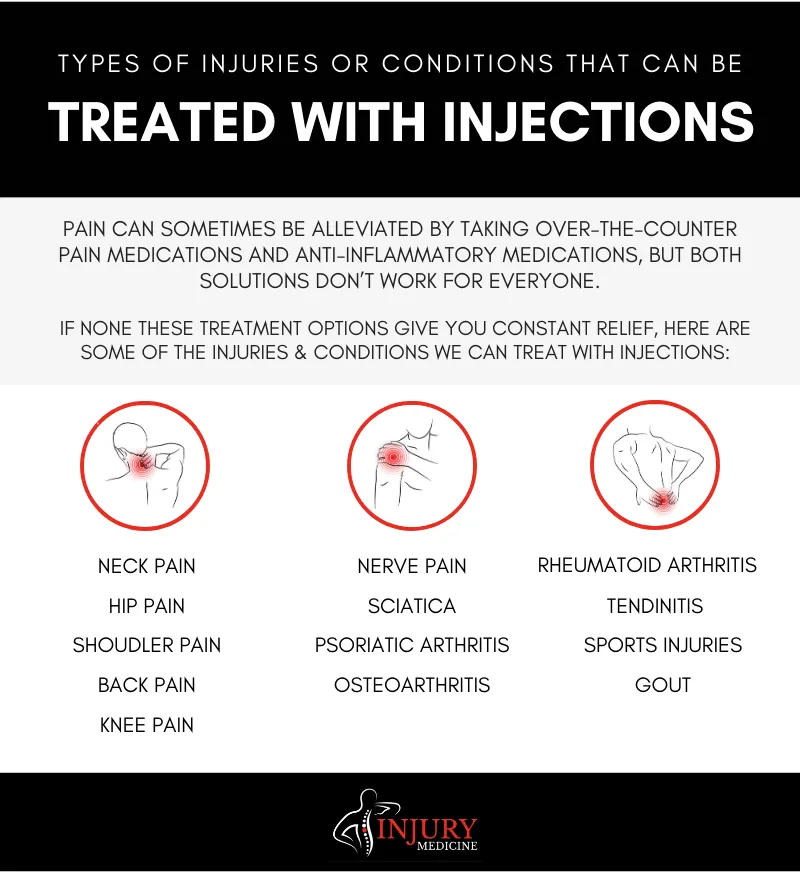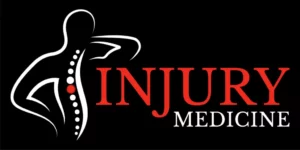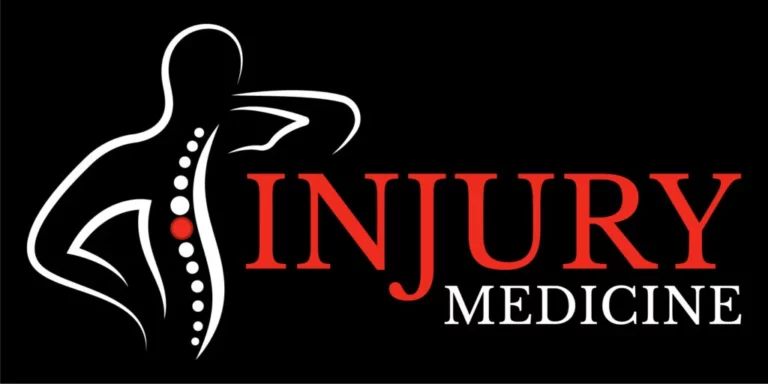Chronic pain can severely limit your ability to live a full and active life. If you suffer from chronic pain, daily tasks can become burdensome chores. Treating pain involves a variety of pain management procedures and one of the most widely used is injections.
Injections can provide either temporary or longer-lasting relief depending on your specific condition, the location of the pain, and its severity. If you’re suffering from chronic pain in Greenville, SC, you can always count on us here at Injury Medicine.
We offer a variety of effective treatment options, including injections for pain in Greenville, SC. Call us today at 864-866-PAIN to schedule an appointment with our pain management specialists!
How Are Injections Used in Pain Management?
Injections are a non-surgical treatment option for acute or chronic pain. They are used for treating pain after other non-surgical measures such as medication has been tried, but before surgery is considered.
Injections can deliver medication directly to the location generating the pain, which can provide better pain relief than oral medications. Injections may work in one of the following ways to help in pain management:
Delivering pain-relieving medication into the area that’s the source of the pain to reduce inflammation and numb the pain.
Blocking pain signals from reaching the brain, either by creating a heat lesion or delivering a pain-relieving medication.
Injections can also be used for helping to determine the anatomic structure that could potentially be the source of the pain, such as a compressed nerve or a herniated disc.
What Are Some of the Types of Injuries or Conditions that Can Be Treated With Injections?
Pain can sometimes be alleviated by taking over-the-counter pain medications and anti-inflammatory medications, but both solutions don’t work for everyone. Other treatment options are applying either ice or heat to the area, and prescription pain medications.
If none of these treatment options give you consistent pain relief, the next step is usually an injection in the affected area. Here are some of the types of injuries or conditions that can be treated with injections:
- Neck Pain
- Hip Pain
- Shoulder Pain
- Back Pain
- Knee Pain
- Nerve Pain
- Sciatica
- Psoriatic Arthritis
- Osteoarthritis
- Rheumatoid Arthritis
- Tendinitis
- Sports Injuries
- Gout
What Are the Different Types of Injections That Are Available at Injury Medicine?
At Injury Medicine in Greenville, SC, we offer a wide selection of injections for treating different kinds of pain, which include:
Radiofrequency Ablation
Radiofrequency ablation, which is also sometimes referred to as rhizotomy, is a non-surgical procedure aimed at disrupting the relay of a pain sensation along the nerve in route to the brain. It involves heating up or “ablating” a section of the nerve to prevent pain signals from passing along to the brain. It is primarily used for treating headaches, face pain, and spinal joint pain.
Sphenopalatine Ganglion Block
Cluster headache is a debilitating disorder whose pain is among the most severe known to humans. Sphenopalatine Ganglion Block injection, however, has been demonstrated as both safe and effective for alleviating pain associated with cluster headache and trigeminal autonomic cephalalgias (TACs).
Sphenopalatine Ganglion Block injection is also used to treat the following conditions:
- Migraine
- Atypical Facial Pain
- Nasal Contact Point Headache
- Temporomandibular Disorder
- Complex Regional Pain Syndrome (CRPS)
- Paroxysmal Hemicrania
- Herpes Zoster
- Trigeminal Neuralgia
Stellate Ganglion Block
The stellate ganglion is part of the sympathetic nervous system located in the neck, on either side of the voice box. A stellate ganglion block is an injection of local anesthetic (numbing medication) into these nerves to provide relief from pain.
The stellate ganglion block may reduce symptoms such as swelling, pain, color, changes in the upper extremity, and can even improve mobility. Stellate ganglion blocks are also used to improve blood flow in patients with circulation problems related to vascular disease.
Nerve Blocks
A nerve block is an injection of a local anesthetic to a targeted nerve or nerve group to alleviate pain. Nerve blocks may provide temporary relief from pain, allow damaged nerves time to heal, and help in identifying a more specific cause of pain.
The purpose of the injection is to “turn off” pain signals coming from a specific location in the body or reduce inflammation in that area. Injecting anti-inflammatory medication as well as local anesthetic helps promote the healing of the damaged nerves.
Healthcare providers may use imaging guidance such as fluoroscopy, ultrasound, or CT scan to help place the needle in the most suitable location. This allows the patient to receive the maximum benefit from the injection.
Celiac Plexus Block
The celiac plexus is a group of nerves in the abdomen that send pain messages to the brain from the kidneys, liver, pancreas, spleen, gallbladder, and bowels (intestines). A celiac plexus block is a pain relief treatment delivered via injection.
The celiac plexus block prevents the plexus nerves from sending pain messages to the brain. It is essentially a type of nerve block. Healthcare providers use celiac plexus blocks for treating people with chronic pancreatitis or pancreatic cancer.
Sciatic Nerve Block
A sciatic nerve block relieves pain by turning off the pain signals that are produced from the injured nerves. The procedure is an injection of anesthesia around the sciatic nerve. It is used for blocking the pain from surgery on the knee, foot, leg, or ankle, or for managing the pain of chronic issues in the lower extremity.
Facet Blocks
Facet joints are located at the back of the posterior spinal column. They are similar to other joints in the body and can be affected by infection, arthritis, or other disorders. Bending and twisting spinal injuries can also cause facet joint irritation or damage resulting in pain.
The facet block procedure involves using imaging guidance to place a needle into the facet joint to deliver a local anesthetic or steroid. Facet blocks can be performed at one or multiple levels and on one or both sides of the spine.
Discography
Discography or discogram is an imaging diagnostic test that uses X-rays for examining the intervertebral discs of the spine. A special dye is injected into the injured disc or series of discs to make them visible on a fluoroscope monitor and X-ray film.
Discograms are used for precisely locating which discs are damaged and are causing back pain. The information gained from the procedure helps healthcare providers determine whether or not surgery is necessary.
Spinal Cord Stimulators
Spinal cord stimulators (SCS) disrupt the pain signals traveling between the spinal cord and the brain. A neurotransmitter (a device similar to a pacemaker) that’s implanted under the skin using an epidural needle is used to deliver stimulation.
The impulses travel over thin insulated wires known as leads from the device to the spine. Mild electrical impulses are then delivered via the leads to an area near the spine. By interrupting the pain signals between the spinal cord and brain, the SCS helps the patient experience pain relief.
Injections for Pain in Greenville Could Be Just What You Need!
Unlike options such as surgery for chronic pain, injections are minimally invasive and carry significantly fewer risks. Injections also don’t lead to addiction, which means that they can be a great option if the pain can otherwise only be treated using potentially addictive pain relief medications.
If you are suffering from acute or chronic pain that has impacted your life negatively, it is important to talk to our experienced doctors at Injury Medicine in Greenville, SC. We can advise you on your treatment options, including the types of injections that may be right for you and whether surgery is recommended for lasting pain relief.
Call us today at 864-866-PAIN to schedule a consultation with our experienced doctors and learn more about injections for pain in Greenville!



